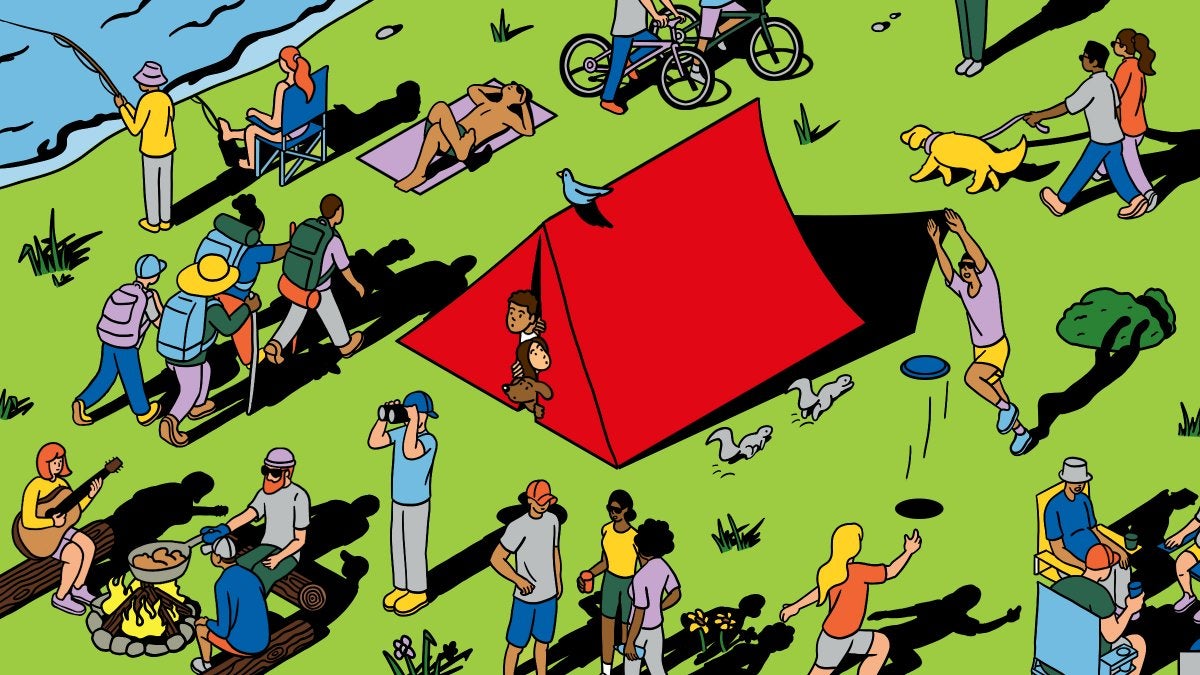No products in the cart.
Outdoor Adventure
Do I Have to Share My Campsite?
Dear Sundog: We were camped legally—and for free—off a dirt road on public lands in the middle of the desert. When Friday night rolled around, the place was packed—all the sites were taken. Then someone pulled in and asked if we would share our site with them. We’d gotten there early so we could be alone. Were we ethically obligated to say yes? —Encroached in Cholla
Dear Encroached: Your instincts are right. Nothing beats hauling your truckload of beer coolers and puffy mattresses and folding chairs and half-cord of split pine into the hinterland and setting up a free campsite on some desolate piece of ground and proceeding to do nothing for a few days.
Alas, your spring break clusterfudge has become oh so common. That secret road where you once boondocked outside Glacier or Moab or Sedona or Bishop got Instafamous, ranked high on the free-camping apps, became a rogue KOA for every fun-hog fifth wheel and Silicon Valley Sprinter van seeking solitude in the sticks. Then the pandemic brought a whole ’nother wave of newbies, a mix of telecommuters liberated from their hometown offices and desperate tourists blocked from their regular destinations: Las Vegas, March Madness, and the Yucatan. Even a seasoned vagabond like Sundog shakes his exasperated head and mutters, “Don’t these people have jobs?”
Of course, nobody intends to camp in a flash mob, amid the toilet paper fluttering from any tree limb that has not already been snapped off for roasting weenies. But once we’ve arrived, it’s too late. It’s getting dark. If the remote primitive camps are all taken, we know all the nearby developed sites are also full. We’ve driven hours. We can’t turn back. This is the situation of the wanderers, Encroached, who asked you to share your precious site. So, must you offer them refuge?
The short answer is no, but the longer answer is probably yes.
It’s your site, finders keepers, first-come first-served, and that could be the end of the story. You are not ethically bound to compensate for their poor planning. But consider for a moment: if you refuse, what will these stragglers do? More than likely they will heave their vehicle up onto some pristine soils and flora and simply make a new site. After all, that’s how all these sites came to exist in the first place, by industrious Americans driving upon nature and rutting back and forth until the turf was flat enough for a good night’s rest.
The last thing your secret spot needs is more desperately implemented sites. Once the crowd arrives, the only way to save it is, instead of spreading people more widely into more sites, to pack them more densely into the ones already there. For the greater good, you might welcome Jesus and Mary and Joseph. It’s good for the land, and you might even make a new friend.
Your question opens a broader one about crowds in the outdoors. There was a time when camping seemed inherently virtuous. First, you were roughing it, doing without electricity and the luxuries of home. That alone was an admirable Spartan minimalism. Next, there is merit in living, if only briefly, among animals, plants, rivers, and rocks, merely to remind us that humans are not the planet’s only species. And lastly, your very presence in the desert or woods indicated that this was a precious place, one worth preserving, not a place for corporations to incinerate toxic waste or for citizens to dump mattresses and refrigerators. But is that still true?
By the old metric, we might call these mobs a success. Anyone who has been a guide, writer, policymaker, or advocate for the earth has repeated some version of this maxim: the more people who enjoy nature, the more people who will work to protect it. This may well be the founding principle of environmentalism, dating back to Theodore Roosevelt’s hunting expeditions and John Muir’s establishing of the Sierra Club with its excursions for greenhorns. Once they’ve seen the Badlands or Yosemite Valley, the average citizen will be filled with sacred rejuvenation and will support efforts to preserve those places for prosperity. Right?
But it’s a hard pill to swallow, to see some pristine place teeming with generators and yahoos running their Razrs over sagebrush, to tell myself, “But they will vote to fund the Forest Service?”
Perhaps the deeper ethical question is not how to behave in a crowd, but do we have a right to solitude? We certainly have a right to enjoy public lands—citizens own them. But can we insist that we get them to ourselves? Surely not in national parks, which have been overrun for decades and have beaten back the congestion with fees, permits, reservations, and densely packed campgrounds. But what about “that old dirt road” where we used to be alone? Does the fact that we “discovered” solitude a decade or two ago give us the right to expect it now?
I think not. By making the claim that our right to solitude trumps someone else’s right to pitch a tent 50 feet away, we enter a new thicket of ethical quandaries, chief among them the fact that many “public” lands were taken from tribal nations through violence, genocide, and broken treaties. The claim of ownership by white settlers is historically dubious; a right to exclusivity does not hold up either ethically or legally.
So, for now, we might just learn to grieve that place, that memory, and learn to avoid our old haunts during high season and holidays. Solitude may still be found, but it’s likely to be in wilderness—places where cars are banned. Lace up your boots and saddle your pony. And that’s a topic for another day.
Lead Illustration: Liam Eisenberg
Source link

